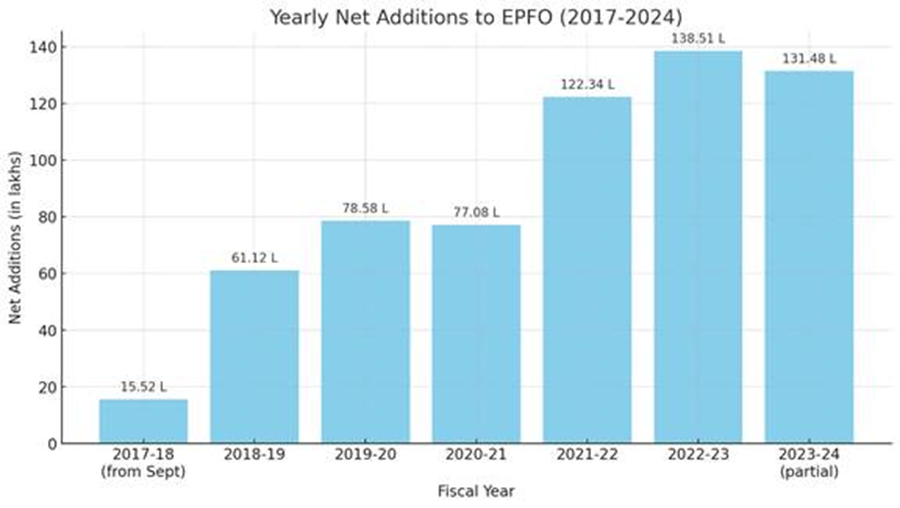Context:
India is witnessing a significant transformation in its economic landscape, characterized by a growing trend toward formalization. This shift, which involves the integration of informal jobs into the structured formal economy, is redefining employment patterns, enhancing job security, and providing social benefits to millions of workers. Formalization is more than an economic concept; it is a societal shift that ensures economic stability and social upliftment for a vast segment of India’s workforce. At the forefront of this transformation is the Employee’s Provident Fund Organisation (EPFO), a key institution managing social security benefits and facilitating this transition.
Understanding the Formalization of the Economy:
What is Formalization?
Formalization refers to the process by which employment in the informal sector—typically consisting of daily wage workers, small businesses, and unregistered enterprises—is absorbed into the formal sector, characterized by structured employment practices. In the formal economy, employees benefit from legal protections, stable incomes, and access to social security.
Key Features of the Formal Economy:
1. Employment Contracts: Workers are hired with clear terms of employment, including salaries, working hours, and benefits.
2. Social Security Benefits: Access to retirement savings, health insurance, and paid leave ensures long-term financial stability.
3. Job Stability: Regular incomes replace daily or weekly wage systems, reducing workers’ vulnerability to economic uncertainties.
4. Increased Worker Rights: Workers gain access to protections under labor laws, including maternity benefits and grievance redressal systems.
The significance of formalization lies in its ability to improve workers' quality of life by safeguarding them against uncertainties and enabling them to plan for a secure future.
The Role of EPFO in Promoting Economic Formalization
What is EPFO?
The Employee’s Provident Fund Organisation (EPFO) is a government body established to manage long-term savings and social security schemes for salaried workers in India. The organization plays a crucial role in formalizing the workforce by ensuring that employers comply with labor laws and provide necessary benefits to their employees.
Key Benefits of EPFO Membership:
1. Retirement Savings:
o Both employers and employees contribute a portion of the employee’s salary to the Employees’ Provident Fund (EPF).
o These contributions accumulate over time, providing workers with financial security after retirement.
2. Insurance Coverage:
o Members benefit from life insurance through schemes such as the Employees’ Deposit Linked Insurance (EDLI), ensuring their families are financially secure in case of unforeseen events.
3. Pension Benefits:
o EPFO also manages a pension scheme under the Employees’ Pension Scheme (EPS), offering retirees a steady monthly income.
4. Emergency Withdrawals:
o Members can withdraw funds for specific needs, such as medical emergencies, children’s education, or purchasing a home, providing flexibility during critical times.
The EPFO thus serves as a robust safety net, ensuring workers can navigate life’s challenges with greater confidence and financial stability.

EPFO Registration: An Indicator of Economic Formalization
Why is Registration Important?
When workers are registered with the EPFO, it indicates that they are part of the formal economy. Registration not only provides employees access to benefits but also reflects employers’ compliance with labor laws.
Trends in EPFO Registration:
1. Rising Membership:
o Between September 2017 and July 2024, over 6.91 crore workers joined the EPFO, highlighting a substantial transition toward formal employment.
o In the fiscal year 2022-23 alone, 1.38 crore new members were registered.
o From April to July 2024, nearly 20 lakh new members were added in July, showcasing accelerating momentum.
2. Youth Participation:
o A significant proportion of new members are first-time job seekers, indicating increased opportunities for India’s younger population in the formal sector.
3. Increased Female Representation:
o The rise in female EPFO registrations reflects progress in workplace inclusivity, empowering women with job security and social benefits.
4. Job Continuity through Fund Transfers:
o Many workers are transferring their EPF accounts when switching jobs rather than withdrawing their savings, ensuring uninterrupted social security coverage.
These trends underscore the positive trajectory of India’s workforce formalization, fostering a more secure and inclusive labor market.
The Broader Impact of Formalization on India’s Economy
Formalization has far-reaching implications for India’s economy, contributing to both social and economic development.
Advantages of Formalization:
1. Enhanced Job Security:
o Workers enjoy stability through structured employment contracts and access to benefits.
2. Social Upliftment:
o Formal jobs provide healthcare, retirement savings, and other protections, enabling workers to lead dignified lives.
3. Economic Growth:
o A formalized workforce increases productivity, compliance with regulations, and tax revenues, boosting economic growth.
4. Reduced Vulnerability:
o During crises like the COVID-19 pandemic, formal workers with access to social security benefits were better protected compared to those in informal jobs.
Challenges to Address:
Despite significant progress, challenges persist in achieving full economic formalization:
- Inclusion of Informal Workers: Many daily wage laborers and unregistered businesses remain outside the ambit of formal employment.
- Awareness Gaps: Educating workers and employers about the benefits of formalization and EPFO membership is crucial.
Conclusion:
India’s transition toward formalization is a pivotal step in building a resilient and inclusive economy. With millions of workers joining the EPFO, the trend reflects significant progress in providing job security and social benefits to a larger segment of the population. The EPFO’s role in this journey is indispensable, offering retirement savings, insurance, and other financial protections that empower workers and enhance their quality of life. As India continues to prioritize formalization, it is creating a workforce that is not only more organized and secure but also better equipped to drive the nation’s economic growth. This journey represents a collective step forward, ensuring that millions of workers can look ahead with hope, confidence, and stability.
|
Probable questions for UPSC Mains exam: Examine how economic formalization in India contributes to job security and financial stability for the workforce. How does the Employee’s Provident Fund Organisation (EPFO) facilitate this transformation, and what are the implications for inclusive economic growth? |








